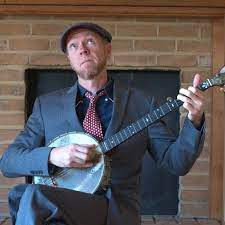The sound of LP Kelly comes broadly from the early days of American roots music: when bluesmen sang from front porches on hot afternoons; when swing bands played dances in speakeasies late into the night; when troubadours were tradesmen and not celebrities. From his base of operations in the Appalachian Mountain town of Blacksburg, VA, Kelly has worked tirelessly to encourage a renaissance in music that has a history and a place – not a watered-down Americana that could exist anywhere on the Internet, nor a rigid recreation of the past, but original music that demands the listener dig deeper to find its roots in geography and time. It’s original music that still sounds familiar. A couple of guitars, a banjo or two, a suitcase of harmonicas, and a whole lot of guts.
A child of a military family, LP Kelly (born Liam Patrick Kelly) got used to travel at an early age, and roots were something that other people had. Every few years, the family would pick up and move to another navy town in another part of the country, and the process of trying to blend in would start again. Learn how to talk like the locals talk. Pretend to be interested in their sports teams, their churches, their food. Listen a lot and don’t say too much. As an adult, old habits die hard. Kelly kept moving, became a musician, and tried on a dozen different roles. Irish musician, punk musician, folk singer, alt-country guitarist, sea shanty singer, etc. But in the old-time music of the mountains of Southwest Virginia, Kelly found something that he hadn’t seen before: a music inextricably tied to geography. Tunes that were played differently from one county to the next. Square dances that were called differently from one mountain to the next. With it came the realization that while you could travel and learn to play the music from a place, you weren’t really taking the music with you. You were just borrowing it for a while, and you needed to give it back eventually.
So LP Kelly fell in with The Jugbusters, a band with a twenty year history in the region, and for the first time in his life, he stayed in once place long enough to become a co-creator of a local tradition instead of just a borrower. The Jugbusters were an old-time mountain string band turned honky-tonk band, and played every tiny country dance hall in the central Appalachian mountains. They shared the stage with pig farmers; they shared the stage with two governors and Senators of the state of Virginia. As before, Kelly learned to listen hard and not say too much, learned to fit in and talk like the locals talk. But unlike before, he actually went native. In places like the Floyd Country Store where he had first gone to take photos as a tourist, now the tourists were taking photos of him. He learned to square dance, and then learned to call square dances. He learned to play fiddle, banjo, upright bass, and won ribbons at fiddlers conventions in each. He took pedal steel guitar lessons from the great Buddy Charleton, steel player for Ernest Tubb, Patsy Cline and Porter Wagoner (to name but a few).
When the Jugbusters finally folded due to the death of their fiddle player, LP Kelly formed The Streetsweepers and started writing new material. It wasn’t exactly old-time Appalachian music, nor honky-tonk country, nor western swing music, but it unmistakably came from all of those places, from all of those years spent playing in the dance halls of southwest Virginia. Elements of clawhammer banjo merged with elements of pedal steel guitar. Old-time mountain fiddling melded with honky-tonk piano and swing drum rhythms. A new music was born, but not born from nothing. It still belongs to a time and place, but it knows how it got there.
A veteran of other recording bands (The Jugbusters, The Don’t Tell Darlings), LP Kelly (formerly Old Man Kelly) released his first solo album, Songs, Stories, Shanties, and Shenanigans in 2013 and his second album, Off My Lawn, in 2016. The start of 2021 brings Love Songs For Loners, a new collection of ten original songs. In the intervening time, LP Kelly has made hundreds of public appearances at bars, festivals, swing dances, square dances, radio shows, house concerts, and on any other stage run by folks who understand that American music has both a past and a future, and that being there matters.











No comments:
Post a Comment